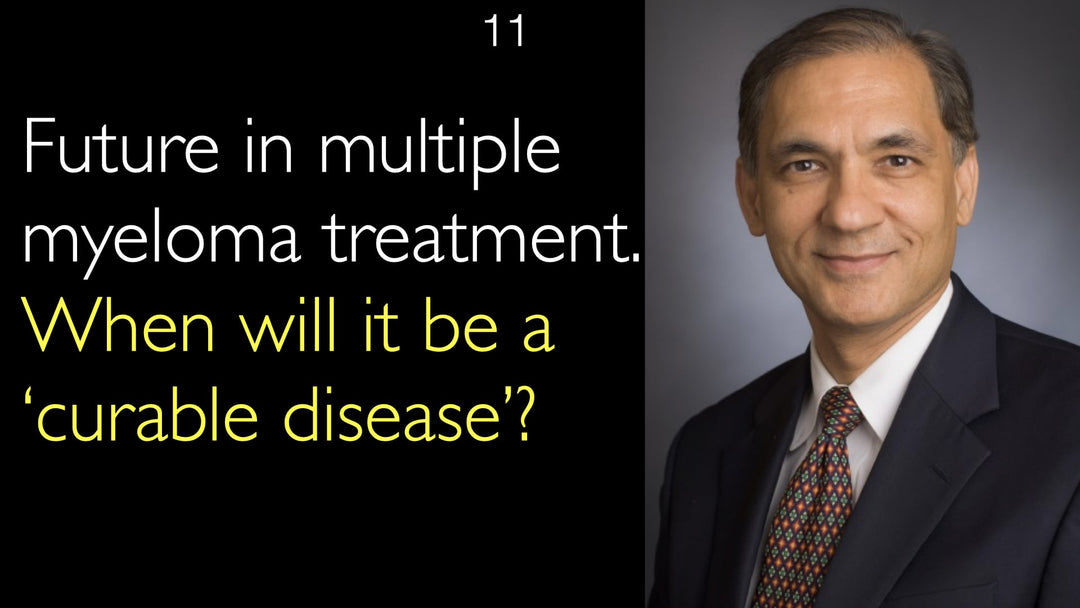多発性骨髄腫の権威、Nikhil Munshi医師(MD)は、現在では多くの患者が実質的に治癒に至っていると説明します。治療の進歩と、CAR-T細胞療法の今後の役割についても言及。Munshi医師は、骨髄腫の長期管理を糖尿病のような慢性疾患に例えながら、治癒の概念についても深く考察しています。
多発性骨髄腫治療の進歩:根治を目指す道のり
セクションへ移動
多発性骨髄腫における根治の現状
ニキル・ムンシー医学博士によると、多発性骨髄腫は現在、多くの患者において既に根治が達成されています。10年前に治療を受けた患者の約15%以上が再発していないと説明しています。これらの患者は当時の最先端治療を受けました。現在の治療法はさらに効果が高く、根治率の向上が期待されています。
ニキル・ムンシー医学博士は、10~15年後に再発した過去の症例があるため、臨床医は「根治」という表現に慎重であると指摘します。この慎重さは、患者が根治したと断言するためには、より長期的な経過観察データが必要であることに由来します。
癌の根治とは何かを定義する
ニキル・ムンシー医学博士は、癌の根治について実用的な定義を示しています。患者が根治したと見なせる2つのシナリオを説明します。1つ目は、疾患が完全に消失し、継続的な治療が不要となる場合です。2つ目は、長期の維持療法により癌の再発を防ぐ場合です。
ムンシー博士はこの考え方を、糖尿病や高血圧などの慢性疾患の管理と比較します。患者がシンプルな維持治療で普通の生活を送れるのであれば、実質的な結果は根治と変わらないと強調します。この視点は、患者が長期的な見通しを理解する助けとなります。
将来の治療動向と目標
多発性骨髄腫治療の将来は、持続的な寛解を達成する患者の特定に焦点を当てます。ニキル・ムンシー医学博士は、長期的な根治をもたらす治療法を特定するためには、さらなるデータが必要だと説明します。目標は、現在の成功を土台に、再発しない患者の割合を増やすことです。
ムンシー博士は、今後数年のうちに、特定の患者グループについて根治を正式に宣言できるだけのデータが得られることを期待しています。これにより、患者は癌の心配なく日常生活に戻ることができます。アントン・ティトフ医学博士との対談では、骨髄腫研究におけるこうした画期的な進展が強調されています。
標準治療としてのCAR T細胞療法
CAR T細胞療法(キメラ抗原受容体T細胞療法)は、多発性骨髄腫治療における大きな進歩の一つです。ニキル・ムンシー医学博士は、この免疫療法が大多数の患者にとって標準治療となると確信しています。CAR T細胞療法は既に80歳までの患者に安全に適用されていると指摘します。
80歳を超える患者など、全員に適しているわけではありませんが、CAR T細胞療法は大多数の骨髄腫患者に恩恵をもたらします。ムンシー博士は、このアプローチで多くの患者を成功裡に治療した経験を持っています。技術の向上と経験の蓄積に伴い、適用範囲はさらに広がり続けています。
患者の生活の質と長期管理
多発性骨髄腫治療の究極の目標は、患者が癌の心配なく健康的な生活を送れるようにすることです。ニキル・ムンシー医学博士は、根治した患者は癌ではなく、一般的な健康維持に焦点を当てるべきだと強調します。心臓の健康、肺機能、その他の年齢に応じた健康管理に集中できるようになります。
ムンシー博士がアントン・ティトフ医学博士との対談で述べたように、重要なのは患者にとっての実用的な結果です。完全な治癒であれ、成功した維持療法であれ、患者は癌による死亡リスクから解放されます。この考え方の転換は、癌治療の成功を捉える上で重要な進歩を意味します。
全文書き起こし
アントン・ティトフ医学博士: ムンシー教授、あなたは多発性骨髄腫および血液癌の分野で先駆的な臨床研究者です。多発性骨髄腫治療の将来はどうなるのでしょうか?いつごろ信頼性高く根治可能な疾患になるとお考えですか?
ニキル・ムンシー医学博士: 現時点で我々は骨髄腫を根治できていると言えますが、もう少し経過観察が必要なため、そう断言するのをためらっています。具体的に言うと、一定の割合の患者がいると思います。我々は皆、過去8年または10年以上にわたり経過を追い、骨髄腫が消失したまま再発していない患者を診ています。
問題は、いつその患者を「根治した」と呼ぶかです。我々はまだそう呼んでいません。なぜなら、過去には10年、12年、15年後に再発した患者がいたからです。そのため、まだ根治とは言い切れないと感じています。一定期間後に患者が再発したらどうするか?
15%以上の患者が長期間再発していません。多くの場合、我々はそれを根治と呼ぶでしょうが、まだそうはしていません。それが現状です。これらの患者は10年前に、当時の最先端治療を受けた人たちです。
現在、我々ははるかに優れた治療法を持っており、より多くの患者に効果をもたらす可能性があります。今後数年のうちに、どの患者が再発せず、どの治療がそれを実現しているかを言い始めるのに十分なデータが得られることを期待しています。
その後、これを基盤として再発しない患者の数を増やし、彼らは正式に根治宣告されるでしょう。そうすれば、彼らは普通の生活に戻ることができます。
さて、根治には複数の意味があります。根治とは何を意味するのでしょうか?治療が終了し、すべてが消失した状態を意味します。何も薬を服用していない——それが一つの形です。あるいは、その二として、患者は維持治療を受けているかもしれません。骨髄腫は再発せず、疾患は安定しています。
つまり、疾患を、例えば糖尿病のような状態に変換することです。しかし、糖尿病を根治できるでしょうか?答えはノーですが、その後70年間非常にうまく管理できます。ですから、癌がそのようになった場合、何が違うのでしょうか?違いはあるべきではありません。
私は患者にこう尋ねます、「残りの人生で1錠の薬を飲むだけで癌が再発しないなら、なぜ心配する必要があるのか?」と。糖尿病や高血圧のような状況と比較すると、それは一種の安心材料となります。
したがって、疾患が完全に消失した状態か、再発せずに長期間単なる維持治療を受ける状態かのいずれかです。いずれの場合も、患者は骨髄腫で死亡することはありません。彼らは他の病気について心配し、心臓、肺、その他の器官のケアに注意を払い、健康的な生活を送る——骨髄腫とそれによる死亡についてそれほど心配せずに済みます。
CAR T細胞療法(キメラ抗原受容体T細胞療法)やその他の免疫療法が、近い将来すべての患者の標準治療となるだろうとも考えます。大多数の患者にとっては確実に標準治療になると思います。「すべての患者」は強い表現です。なぜなら、80歳を超える一定の年齢では、その有用性は少し低下するからです。
しかし、80歳までなら、現在CAR T細胞療法を行っています。安全に実施した患者は数多くいます。ですから、適用範囲は大多数の患者を含むように拡大しており、それらの患者全員の標準となるでしょう。ごく少数の患者については、その使用方法と時期に注意する必要があるかもしれません。




